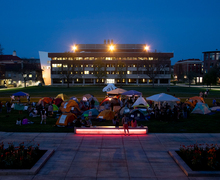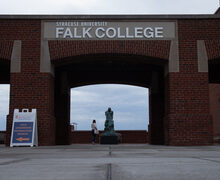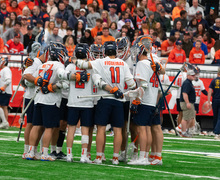Profile: Gubernatorial candidate Gov. George E. Pataki
A garden of hands clenched tightly to tiny red, white and blue flags, the brightest semblance of color on this dismal Syracuse day.
A late August rainfall forced the 250 family members of victims of the World Trade Center attacks to equip themselves with giant blue umbrellas while they sat facing the eight pillars that formed a memorial commemorating the Sept. 11, 2001 terrorist attacks.
The gray sky and a light mist blurred the scene. But one could still spot the nation’s colors through the hands.
Gov. George E. Pataki entered with Lt. Gov. Mary O. Donohue to dedicate the memorial at the Great New York State Fair. Bypassing the podium and the pomp and circumstance of a typical political visit, Pataki took a seat in the front row among the victims.
He was one of them.
“Never in my life have I ever seen our state and our country as unified as we are today,” he told the crowd.
The scene ironically parallels that of the incumbent’s first eight years in his Albany office. Facing a faltering economy, national crisis and a split Assembly, the Republican front man has been forced to show his colors through a dreary drizzle of politics.
“He’s a guy that’s covered a lot of area,” said Jeffrey Stonecash, chairman of the political science department at Syracuse University. “He genuinely is a person that tries to respond to constituents.”
When he came to Albany, Pataki, like most politicians, promised change in New York. But unlike many politicos, when Pataki promised change, it seemed he meant it, said Peter Cappuccilli, Jr., Onondaga County coordinator for the Pataki campaign and the director of the Great New York State Fair.
“At his inauguration speech he basically laid out the challenges ahead of him to make New York the great state that it used to be,” Cappuccilli said. “At that moment I turned to my wife and said, ‘This man is going to make us proud to be New Yorkers again.’ “
Now, Pataki boasts a record of health care reforms, including plans to recruit and retain qualified medical professionals, the creation of economic initiatives, such as the Empire Zones and Centers for Excellence and an increase in the amount of tuition assistance given to New York college students.
“He knows what’s going on,” Cappuccilli said. “The man is on top of everything and he cares about everything going on in the entire state.
“The state eight years ago was a nightmare. He’s really turned it around.”
But some would say he failed to keep his promise for improvement.
His opponents criticize him for a poor economy, high taxes and a 33 percent increase in the state debt. In campaign advertisements and debates, both Democratic Party candidate H. Carl McCall and Independence Party candidate Tom Golisano, criticize the incumbent for politicizing the economy.
Golisano’s campaign blames Pataki for a 45 percent increase in state spending and lagging upstate development.
Yet the governor’s lead in the polls has remained in the double digits throughout campaign season. In fact, in the week before the election, his lead jumped 20 percentage points, according to a Marist College poll, which attributed the drastic lead to increasing public anticipation for a Pataki victory.
That coupled with the fact that his main contenders split the votes among those unhappy with the state nearly guarantee Pataki a win on Election Day, Stonecash said.
Experts like Stonecash predict that another four years in the governor’s mansion is a sure bet for the man who grew up on a farm in Peekskill, Westchester County, the son of Hungarian immigrants. There, in the tree-lined landscapes by the Hudson River, is where he learned to build a career from the ground up.
At least that’s the image his oldest daughter, Emily Pataki, has been promoting on her campaign tours across the state.
Dressed in a red turtleneck sweater and brown corduroy pants, Emily Pataki, 23, looked as if she just came off the Quad when she visited Syracuse University on Oct. 8. The visit was part of the 2001 Yale graduate’s tour of college campuses to promote her father.
“When he asked me to join the campaign it was very much a father/daughter thing,” she said. “It was very much a labor of love.”
Emily Pataki’s visit to the Hill was also an attempt to politically mobilize students, who make up the smallest voting bloc, she said.
“We’re reaching out to people who want to be part of the Pataki team,” she said. “Hopefully they’re getting the message.”
Some students did not need a push from Emily Pataki to get excited about the upcoming election.
Junior Ian Weston worked for the New York Republican State Committee this summer and had an opportunity to work for the governor’s campaign in New York City. One of the highlights of the policy studies and political science major’s summer was when he met Pataki at the Republican State Convention and talked to him for about 20 minutes.
It was that first impression that sparked Weston’s loyalty to the governor.
“He’s a very down-to-earth guy,” he said. “Someone who could kind of point me in the right direction or give me some guidance.”
And it was this lasting impression that has drawn Pataki supporters during this season’s statewide campaign.
“When you talk to him, he looks at you like your concern is the most important thing to him,” Cappuccilli said.
But while his appeal seems to be great enough to garner Pataki a victory on Tuesday, the road to Election Day can turn unexpectedly, Stonecash said.
“Now, he just needs to stay out of trouble,” he said. “But you still never know.”
Published on November 3, 2002 at 12:00 pm




